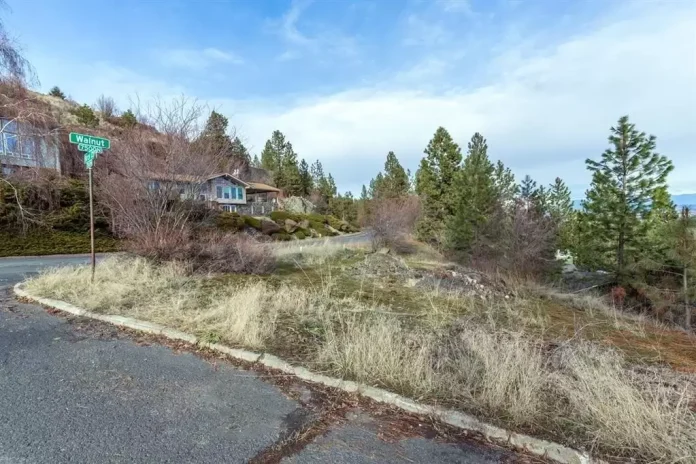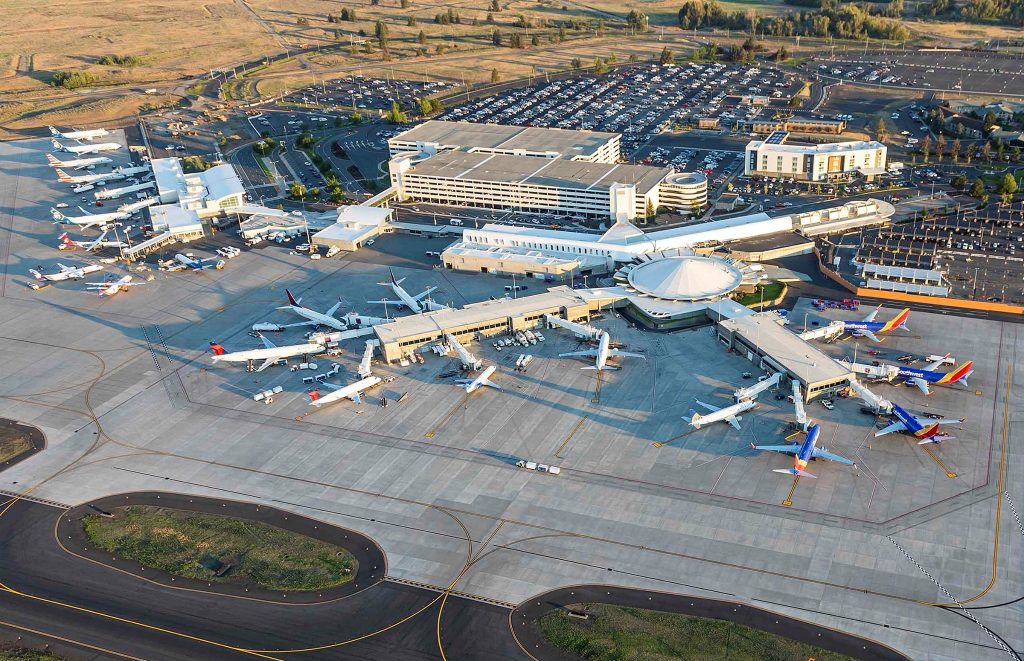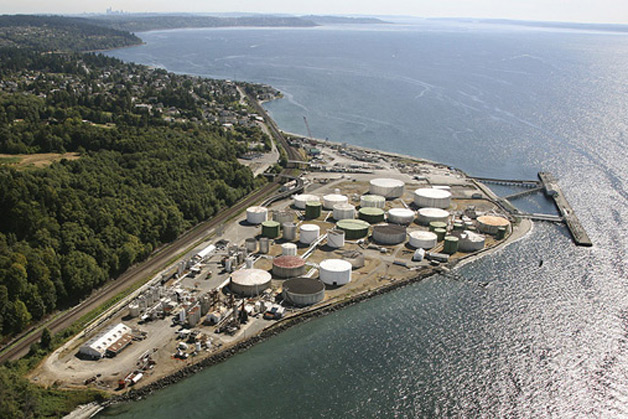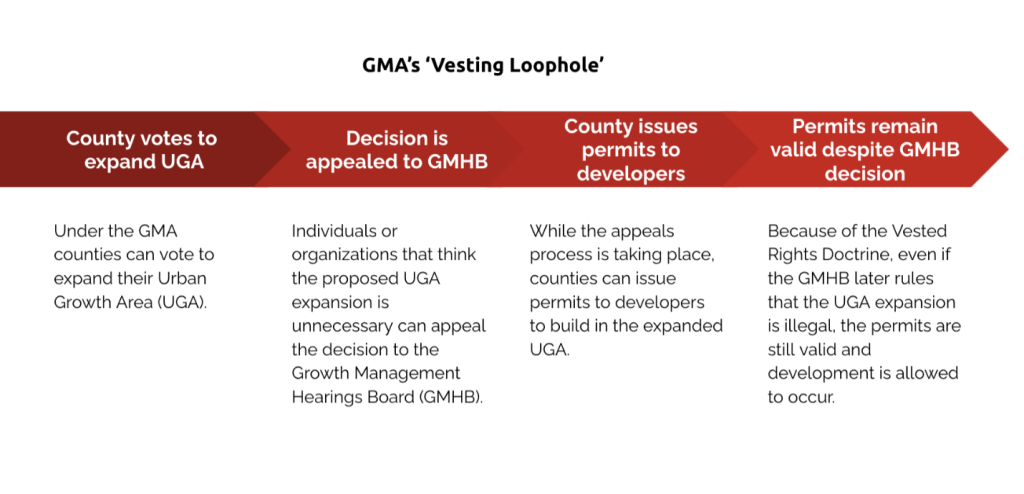
Note: This article was revised on 10/29/21 to reflect Futurewise’s decision to rename the “vesting loophole” as the “illegal growth loophole” to more clearly convey to the public its negative consequences.
This is the second installment of a three-part series that is breaking down what the Growth Management Act Illegal Growth Loophole is, what it looks like in practice, and how Futurewise is working to fix the loophole in 2022 to protect our rural lands and communities. The first installment was Goodbye Farmland, Hello Mega-Mansions.
In our first article of this series, we discussed what the Vesting Rights Doctrine is and how it undermines the intent of the Growth Management Act (GMA) to manage urban growth and reduce sprawl. For a brief recap, this is how it works:
With a bit better grasp of what we mean when we say ‘vesting loophole,’ (ie. illegal growth loophole) let’s dive into the damaging impacts that it has had in communities across the state.
Spokane County

Spokane County expanded its urban growth areas (UGAs) in July 2013. The expansions had many problems including no funding for the new schools that the UGA expansions would require, even though existing schools in areas outside of the expansions had available capacity. One of the expansions also threatened the viability of Fairchild Air Force Base, the county’s largest employer.
It took just over four months for the Growth Management Hearings Board (GMHB) to decide the expansions violated state law and to issue an order of invalidity which prevented new subdivisions from vesting. However, during this short time prior to the board issuing its order, subdivisions that will create 640 new lots vested to the illegal UGA expansions. That is an average of five lots a day. Because the permits had been vested prior to the GMHB decision, the development proceeded despite the ruling.
This is not the first time that Spokane County has adopted new but illegal land use laws and allowed development to vest to them. In the Palisades Neighborhood in Spokane County, a UGA expansion was approved that would allow significantly more development close to Spokane International Airport. These changes were widely opposed by Spokane International Airport, the Chamber of Commerce, two neighborhood groups, and many individual citizens. After the approval of the project, two neighborhood groups and an individual citizen filed an appeal with the Eastern Washington GMHB and the board found the expansion non-compliant with the GMA. Despite the order finding the county in violation of the GMA, the board’s ruling could stop the project, because the permits for building have vested rights despite concerns that the development would adversely affect airport operations.
In the Five Mile Prairie Neighborhood in Spokane County, the county approved another expansion of its UGA. Citizens groups appealed to the GMHB because the neighborhood contains extensive critical areas, including landslide-prone areas and aquatic sensitive areas. They also argued that there were inadequate police, roads, and schools to serve an urban expansion. Despite the appeal, development permits were filed and vested. The board later found the expansion noncompliant with the law and issued an order of invalidity, meaning that from the date of the order most types of developments could no longer occur. However, the permits applied for prior to the invalidity order will be built, even if they are in dangerous areas and underserved by police, schools, and adequate road access.
Clark County
In 2016, Clark County expanded the La Center UGA by 56 acres and the Ridgefield UGA by 111 acres. Both expansions were onto agricultural lands of long-term commercial significance in violation of the GMA. The land still qualified as agricultural land and Futurewise appealed the expansions. While the GMHB was considering the appeal, two cities annexed the land into their city limits mooting the appeal because it was no longer in county jurisdiction. In both cases, the farmers who leased and rented the land were no longer be able to do so. The Ridgefield UGA expansion is particularly problematic because it makes the farmland to the west and north harder to farm, a result of the residential subdivision currently under development. In addition, hundreds of lots were also vested to illegal rural densities.
This is the second time that Clark County illegally expanded its UGAs onto agricultural lands and had cities annex those lands. In the county’s 2007 comprehensive plan update, it was Camas and Ridgefield UGAs that were expanded. In this same year, nearly 1,000 homes were given the green light in a part of the county where ten would have been allowed otherwise, and 514 lakeside acres previously set aside for farming were designated instead as industrial and office park land.
Clark County alone lost over 500 acres of farmland to illegal UGA expansions in the last 15 years.
Snohomish County

Point Wells — a 61-acre waterfront site in unincorporated Snohomish County — was used for industrial purposes for 100 years. BSRE Point Wells asked for a comprehensive plan amendment to put in more than 3,000 housing units and 100,000 square feet of commercial and retail space. Woodway and Richmond Beach concerned neighbors objected, due to the cost of expanding their utilities and roads to serve the area.
Before the GMHB issued its decision, BSRE filed two building permits. The next month, the board ruled the comprehensive plan amendment was illegal. The courts upheld this decision. However, because the project had vested, it still got to move forward.
The illegal growth loophole in the GMA may be policy-wonky and hard to explain, but it has very real and profound impacts on communities, farmland, forests, and other critical habitats when it is exploited to allow for non-compliant development. For too long, the interests of developers have taken precedent over those of communities, farmers, and civilians.
That is why Futurewise has been working for 12 years to close the illegal growth loophole by passing a bill in the state legislature to amend the GMA. For a deeper dive into our legislative journey to address this issue, and what it will take to find success in 2022, stay tuned for our third and final installment of this series.
Futurewise works throughout Washington State to encourage healthy, equitable, and opportunity-rich communities and to protect our most valuable farmlands, forests and water resources through wise land use policies and practices. Founded to help support implementation of the first-in-the-nation Growth Management Act, we focus on directing equitable growth into our urbanized areas and preventing the conversion of wildlife habitat, open space, farmland, and working forests to subdivisions and development.



